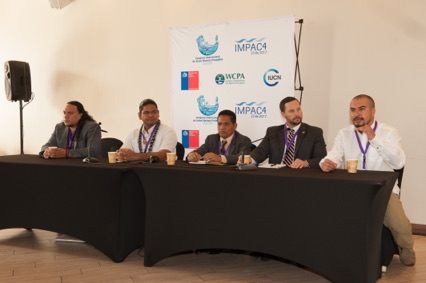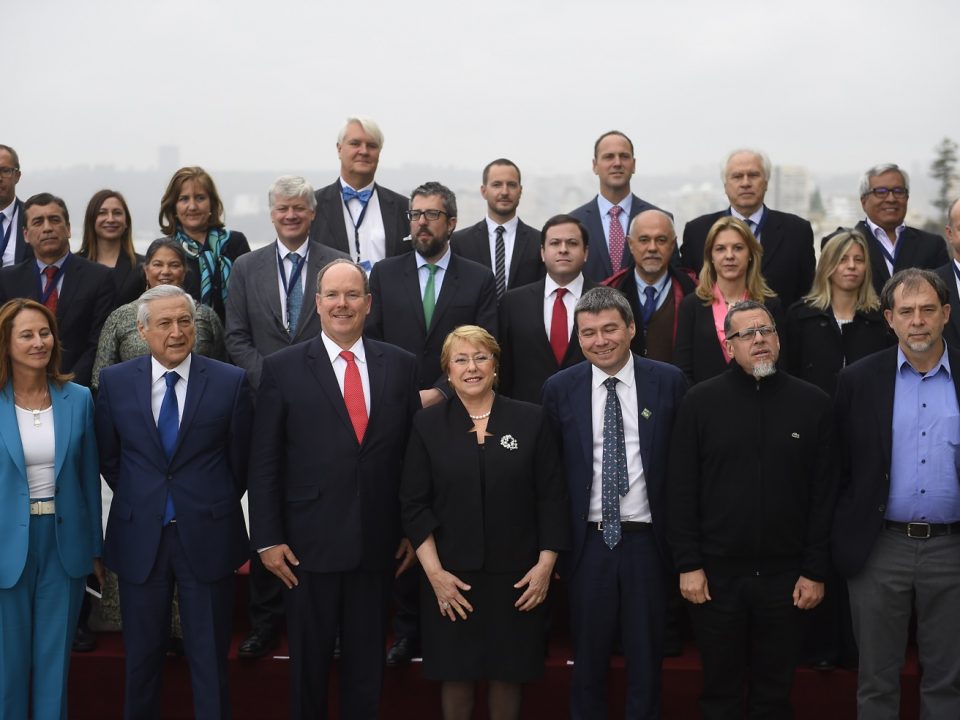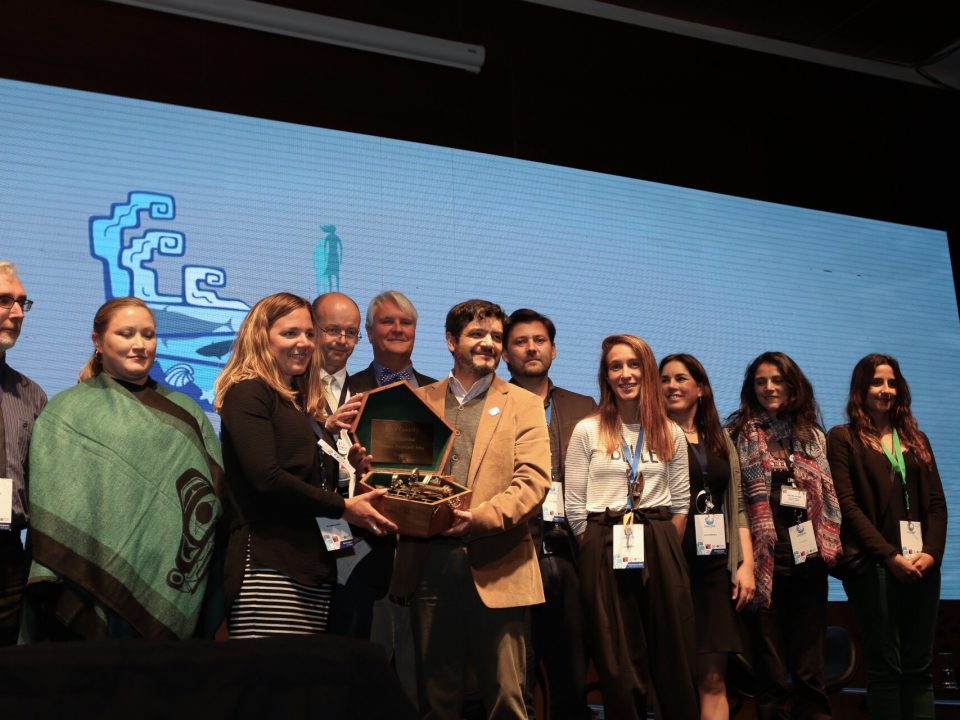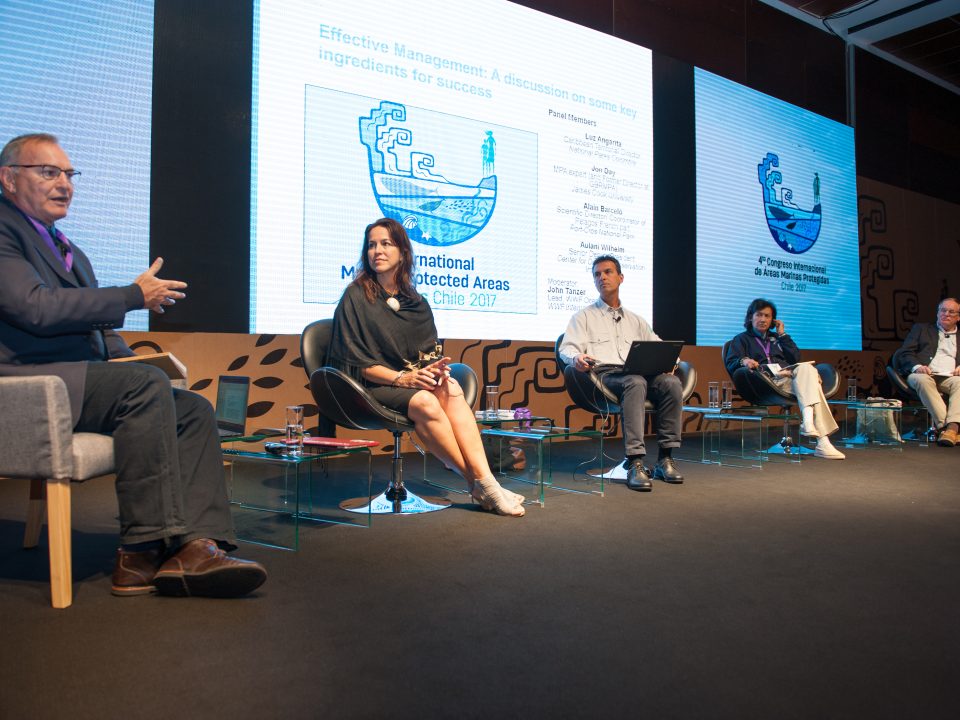Development and economic growth, opportunities and consequences of artisanal fisheries, appreciating ecosystem services beyond their economic value and the role of Marine Protected Areas (MPAs) in social conflicts, were some of the issues thoroughly discussed during this third conference day at IMPAC 4, which begun with the panel on Marine Protected Areas and Coastal Communities.
John Armor. Director of NOAA’s Office of National Marine Sanctuaries and the moderator of today’s opening panel, started the conversation by pointing out that “it is not possible to build walls and keep people out, but we rather need a common understanding and a genuine commitment to achieve a better living for all human beings.”
Armor added that the multifaceted approach the agency he represents takes, when facing a new project, is what helps community ideas prevail. “The method considers an Advisor Council composed by members ranging from 18 to 80 years old and which is permanently communicating with the community to identify what’s important.” He emphasized that protection efforts are not for our present generations, but for those who come, and therefore it is critical to involve them in marine protected areas.
For its part, Poki Tane Haoa, fisherman and representative of Rapa Nui (Chile), centered his reflection on the recently reached agreement that creates a marine and coastal protected area of multiple use in Rapa Nui Chile, which was announced last Monday September 4th by the Foreign Affair Minister of Chile. He referred to this agreement as a big step but “it is just the beginning, as it requires a commitment to continue pushing work through consensual agreements and not impositions.”
He was categorical when stating that “we are 3.000 kilometers away from the continent and trusting a distant State is difficult, because the authorities through their administration have built barriers and mistrust within the community. But we do not have time for a political discussion and that is why we have decided to move forward, asking people to trust by giving them hope.” He also said that ancestral Rapa Nui knowledge must be perfected with new technologies in order to have effective inspections in such a vast protected area like the one mentioned, covering over 700 km2.
Kalani Quiocho from Hawaii’s NOAA in the United States, recalled the number of decades it took to effectively safeguard a marine protected area of 1.5 million km2, which represents an international achievement and “a contribution to conservation with global implications. We have the right over our resources and the right to protect them.
As part of their management model, he highlighted the different tools they use, as educational campaigns and interpretative centers. “They are remote places that people can’t visit; even our own people don’t have access to. What we did was to bring the place to the people when you can’t bring the people to the place, through museums and images show the richness of the places that relate to the local community. This is important because the people can experience the place in some degree and understand how this places are connected with our culture.” Finally he stressed the importance of “working with future generations in mind, because they are the ones who will have to confront in the future our present actions. They are going to experience what we have done, not us, so we need to prepare them to reposition us in the future. It is through our failures and successes that they will have to learn”, Quiocho affirmed.
Felipe Paredes, former Mayor of the Juan Fernandez Archipelago (Chile) referred to the original island settlement that unlike other territories, did not have original inhabitants and was therefore colonized. “We are the first not indigenous community to self-impose management measures. Our rule is to agree based on common sense, and that is why we decided not to fish out in the open sea; we had enough with fishing within 24 miles from the coast. The real challenge was to convince authorities of this, not the community.”
Paredes also emphasized that today’s main threats are climate change and ocean pollution, and that the efforts being made to protect marine zones are immense, especially when taking into account the food security problems humanity is now facing. “We have the responsibility to contribute, and the recovery of Juan Fernandez is a light of hope. Our planet is talking to us. We are all islanders because we can’t escape this planet. We need to heal it, and the approach to achieve that is by working together as allies, asking communities how they can be helped, because they are the ones who best know what direction our actions must take”, he added.
Gustavo Cabrera from the CCO-OMOA (Honduras), pointed that the ocean was left unprotected for so long that the community did not know where to begin. He talked about the Honduras Gulf case which involves three countries (Belice, Guatemala and Honduras) that speak two different languages (English and Spanish), and have enourmous conservation problems due to illegal and furtive fishing. “Closed seasons were not working, so we created thematic worktables (one of them about fisheries), Fishing Forums along the Gulf, at a national and regional level, with the participation of authorities, NGOs, fishermen, and academia, to establish the concept of governance in order to create a Restorative Fishing Zone. Through this process was established that within the MPA would be a specific no take zone that would act as a natural seedbed”. He emphasized that learning comes from doing, and that scientific knowledge must supplement local knowledge. He also pointed to the importance of social networks, which have helped to raise awareness, amplifying the efforts of people that risk their lives every day for these causes.
Side Events
In parallel, at the Ovo Beach sector in front of the hotel, several interesting side events were held, like the “Circular Economy and B Corporations” talk in charge of Thomas Kimber from Karün, a company that produces sunglasses with natural and renewable raw materials, and Verónica de La Cerda from TriCiclos, a company specialized in recycling. Another stimulating presentation was “Action for Ocean Conservation” carried out by the renowned national surfer Ramon Navarro and member of Punta de Lobos Foundation.
From 18.30 hrs onwards the first session of the short film festival “Short Films in Front of the Sea”, is being projected as an open event of IMPAC4 in La Serena beach front. A number of audiovisual productions inspired by the sea and their protagonist will be showcased, among them, one inspired in the life of surfer Ramon Navarro.
The program of IMPAC 4 resumes this Thursday September 7th at 8.30 hrs with the plenary “Effective and Successful Management of Marine Protected Areas”. Panel members will include Jon Tanzer from WWF, Jon Day from ARC (Center of Excellence for Coral Reef Studies de Australia), Aulani Wilhelm from Conservation International, Luz Angarita from Colombia National Parks and Alain Barceló from France’s National Park Port Cros.
For more information visit the web site: www.impac4.org
Follow us on social media:
Twitter: @impac4_Chile / #IMPAC4
FB: IMPAC 4 Chile
Instagram: impac4chile2017
Press contacts IMPAC 4:
Eliana Chong
comunicacionesimpac4@neuronagroup.cl
++569 8502 2462
Héctor Mondaca
prensaimpac4@neuronagroup.cl
++569 8479 7407




